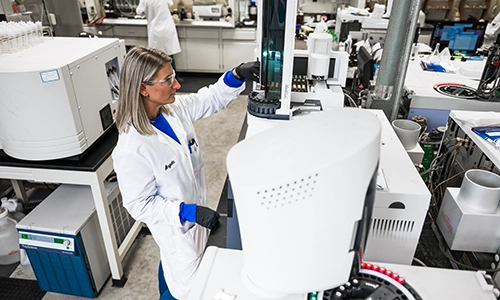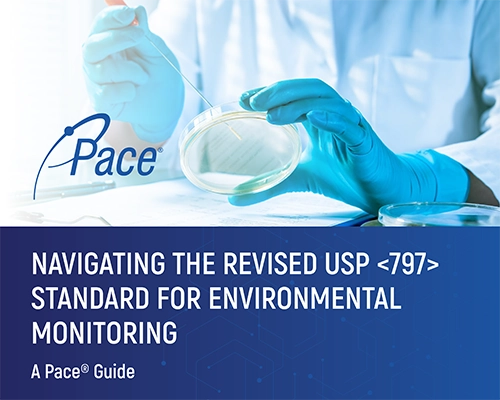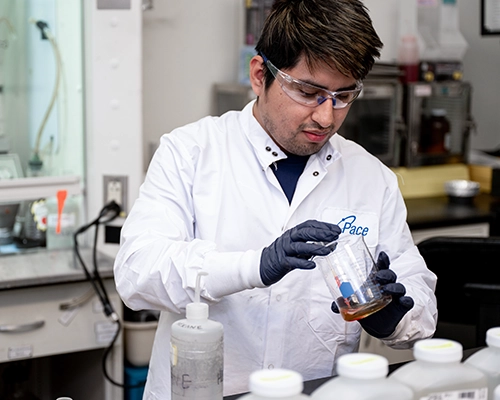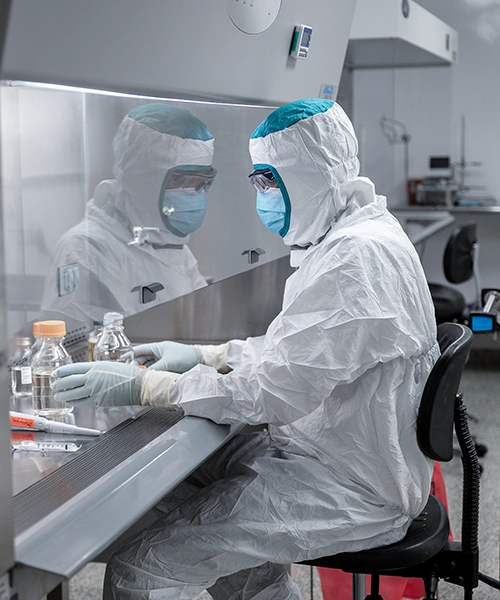Pace® USP 797 Environmental Monitoring Services
Pace® sample culture and analysis services help compounding pharmacies, hospitals, and other healthcare providers maintain compliance with the USP 797 guidelines to ensure the safety and efficacy of compounded sterile preparations (CSPs). Compliance areas we support include:
- Aseptic Competency Testing
- Viable Surface Sampling
- Viable Air Sampling
- Gloved Fingertip Testing
- Media Fill Analysis

What Is USP 797?
USP 797 is a set of guidelines established by the United States Pharmacopeia (USP) to ensure the safety and quality of CSPs. USP 797 covers various aspects of sterile compounding, such as personnel training, environmental monitoring, quality control procedures, and documentation. By adhering to USP 797 standards, healthcare facilities can minimize the risk of contamination, enhance patient safety, and ensure the potency of compounded medications.
Get The Guide!
Looking for an overview of USP 797 revisions? Download Navigating the Revised USP <797> Standard for Environmental Monitoring today!

What Are The USP 797 Environmental Testing Requirements?
USP 797 requires several different types of testing to ensure product efficacy, personnel competency, and patient safety. The latest standards became official on November 1, 2023, further minimizing the risk of environmental contamination in compounded sterile preparations (CSP)

According to USP 797, each classified area, including each room and the interior of each ISO Class 5 PEC (Primary Engineering Control) and pass-through chambers connecting to classified areas, must be sampled for microbial contamination using a risk-based approach. For entities compounding Category 1 and Category 2 CSPs, surface sampling of all classified areas and pass-through chambers connected to classified areas must be conducted at least monthly.
| ISO Class | Surface Sampling Action Levels (cfu/media device) |
| 5 | > 3 |
| 7 | > 5 |
| 8 | > 50 |
Viable air sampling is used to assess air quality within a cleanroom environment. Air samples are collected and evaluated for the presence of viable (living) microorganisms, such as bacteria, yeasts, and molds. This helps ensure the air in the compounding environment meets the required standards of cleanliness, thereby minimizing the risk of contamination.
The 2023 revisions to USP 797 increase the location requirements for viable air sampling. In addition, incubation for fungal samples now requires an incubator with cooling capabilities as the revised incubation temperature range is lower than the typical ambient room temperature in most lab environments.
| ISO Class | Air Sampling Action Levels [cfu/cubic meter (1000 liters) of air/media device] |
| 5 | > 1 |
| 7 | > 10 |
| 8 | > 100 |
Gloved fingertip sampling is a direct assessment of the effectiveness of the garbing process, as it evaluates the cleanliness of one of the most critical parts of the attire—the gloves. In a gloved fingertip sample, compounding personnel press their gloved fingertips, including thumbs, onto a sterile agar plate, which is then incubated and assessed for microbial growth. This analysis is key to ensuring the gloves are free from microbials and that proper aseptic technique is maintained during compounding processes.
The 2023 revisions to USP 797 increase the frequency of sampling, training, and evaluation of compounding personnel. As with other revisions, these enhanced requirements are meant to ensure the quality and safety of compounded sterile preparations.
| Gloved Fingertip and Thumb Sampling | Action Levels (cfu, total from both hands) |
| After garbing | > 0 |
| After media-fill testing | > 3 |
Media fill testing, also known as simulated-use or process simulation testing, is a critical component of USP <797> compliance. By simulating the compounding process using a microbial growth medium instead of actual drug ingredients, media fill testing verifies the aseptic technique of compounding personnel and identifies potential areas of concern.
Aseptic manipulation competency testing combines the above components to validate processes and personnel. Aseptic competency testing should be performed initially for all three categories. Thereafter, Categories 1 and 2 should be done at least every six months and Category 3 at least every three months. Individuals overseeing compounding personnel must also complete an annual competency manipulation. Failure of a gloved fingertip test, media fill test, or surface sample results in failure of the aseptic manipulation for that CSP personnel.
Order Sampling Kits
Pace® USP 797 Compliance Kits ensure you have the materials you need to meet the revised USP 797 sampling requirements. These kits are available on a configurable subscription basis and include all the materials needed for surface, gloved fingertip, and media fill kit sampling. Kits also include packing materials to ensure fast shipping and that samples arrive intact. All USP 797 Compliance Kits are sold through the Aerobiology ordering site. Aerobiology is a Pace® lab focused on USP 797 compliance and other environmental microbiology testing services.
Matrix | Analysis | Supplies |
|---|---|---|
Air
| Bacterial counts to genus level as per new revision
Fungal counts to genus level as per new revision | TSA petri plates or contact plates
SabDex petri plates or contact plates |
Surface | Bacterial counts to genus level as per new revision
Fungal counts to genus level as per new revision
| TSA contact plates,15x65mm
SabDex contact plates, 15x65mm
|
Gloved Fingertip (GFT) | Bacterial culture with counts
Fungal culture with counts
| TSA petri plates, 15x100mm |
Media Fill | Sterility competency for media fill (GFT and surface sampling must be performed immediately following the media fill test.)
| Kits include:
Empty sterile bags
Empty sterile vials
Sterile tryptic soy broth bag
Sterile tryptic soy broth vials
Syringe(s)
|

Cleanroom Certification and Facility Qualification Services
Pace® cleanroom certification and testing services help ensure optimal conditions within controlled environments. Whether launching a new space or maintaining existing facilities, our service portfolio helps satisfy safety and compliance standards, including Current Good Manufacturing Practices (cGMP), Institute of Environmental Sciences Technologies (IEST), International Organization for Standardization (ISO), and United States Pharmacopeia (USP).
We also provide certification and qualification services for cleanroom equipment, such as biosafety cabinets, fume hoods, laminar flow hoods, compounding isolators, compressed gas and air lines, and other equipment with specific user requirements.